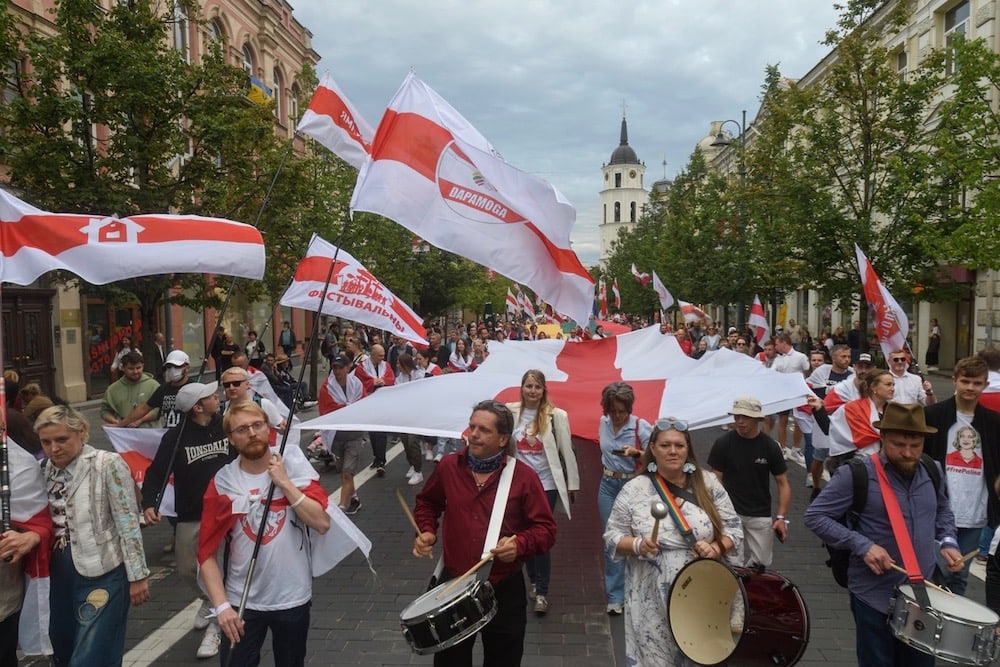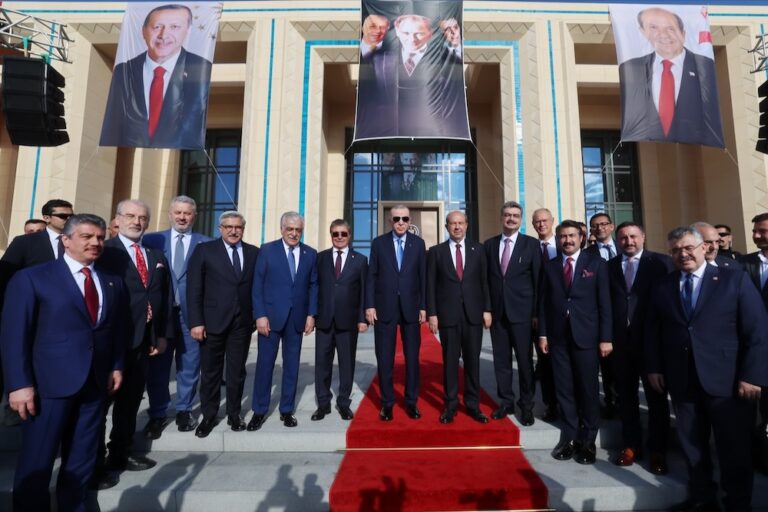August 2023 in Europe and Central Asia: A free expression round up produced by IFEX's Regional Editor Cathal Sheerin, based on IFEX member reports and news from the region.
IFEX members mark the third anniversary of the ongoing crackdown on civil society in Belarus; exiled Russian journalists allegedly poisoned; CASE report shows litigants in Poland, Malta and France file most SLAPPs in Europe.
Three years of repression
On 9 August, IFEX members and other rights groups marked the third anniversary of the unfair presidential election in Belarus that kept President Lukashenka in power, triggered a wave of popular protest against the result, and launched a harsh crackdown on freedom of expression and civil society.
IFEX published a Q&A with the Belarusian Association of Journalists (BAJ), focusing on the situation on the ground for Belarusian journalists and civil society, and highlighting BAJ’s ongoing Solidarity Marathon.
Launched by BAJ and the Lithuanian Union of Journalists on World Press Freedom Day 2023, the Solidarity Marathon aims to keep the challenges faced by independent Belarusian media in the public eye. It asks citizens around the world to download portraits of imprisoned Belarusian journalists, take photos with them near landmarks and other recognisable places, and then upload them on social media.
The 9 of August also saw:
- The European Federation of Journalists (EFJ) publish a declaration of solidarity with Belarus’s imprisoned journalists, calling for their immediate release, and urging members of the public to take part in BAJ’s Solidarity Marathon.
- Freedom House call for the release of all political prisoners and on the international community to “stand with democratic actors in Belarus and demand justice for the victims of the Lukashenka regime”.
- The International Press Institute (IPI) call for the release of all jailed journalists, for restrictions on the media to be lifted, and on the international community to support independent Belarusian media, including those in exile.
- PEN America release a statement focusing on the repression of writers and intellectuals, and urging the Council of Europe, the EU and the OSCE to do more to protect these independent voices, including by putting in place “special funding to protect Belarusian culture” and “more simplified visa procedures for writers fleeing Belarus”.
- PEN International and PEN Belarus call on Lukashenka’s government to end the crackdown on dissent, highlighting the case of the imprisoned artist Aleś Puškin who died in prison in July 2023 after being denied access to urgent medical care.
- Reporters Without Borders (RSF) condemn a “new wave” of repression in Belarus which, unusually, is targeting employees of state media and outlets that “usually toe the government line”.
- The International Federation for Human Rights (FIDH) and the World Organisation Against Torture (OMCT) publish a new report – Suppression of the Right to Defend Human Rights in Belarus – which focuses on the restrictive legislation and tools deployed by the state to repress civil society.
Lukashenka’s “purge” of civil society continues. On 23 August, it was reported on Belarusian state news that the renowned civil society organisation, Viasna Human Rights Center, had been declared “extremist” by the authorities. Five members of Viasna – including its Nobel Prize-winning chairperson Ales Bialiatski – are currently serving long prison sentences on trumped-up charges.
Poisonous climate for free expression
The crackdown on civil society and independent media in Russia also continues unabated.
On 4 August, the imprisoned opposition leader and anti-corruption activist Alexei Navalny was sentenced to another 19 years in prison on several dubious charges including “extremism”, involving children in “illegal activities”, and the rehabilitation of Nazism. The sentence was handed down during a closed trial, and was described by Human Rights Watch as “a testament to the Kremlin’s resolve to decapitate Russian opposition for many years to come”.
Navalny is already serving sentences totalling 11.5 years on similarly bogus charges and survived an attempt to poison him in 2020. The EU condemned the new sentence and called on Russia to comply with a European Court of Human Rights (ECtHR) interim measure requiring the immediate release of Navalny from prison.
Mid-month, a Moscow court ruled to dissolve the Sakharov Center, one of Russia’s oldest and best-known human rights organisations. The decision came after the Justice Ministry filed a court order accusing the organisation of various violations of the law, including of “foreign agent” legislation. In January, the Moscow municipal authorities evicted the Sakharov Center from its premises due to its “foreign agent” designation.
August also saw:
- The Supreme Court uphold the 22-year prison sentence of journalist Ivan Safronov, who was dubiously convicted of treason in 2022.
- Dutch journalist Eva Hartog and Finnish journalist Anna-Lena Laurén denied work visas and accreditation to report from Russia; Hartog, who was still in Russia at the time of the decision, was given six days to leave the country.
- Allegations by exiled independent journalists Elena Kostyuchenko and Irina Babloyan that they were poisoned in Germany and Georgia respectively in October 2022.
- Reports that imprisoned Crimean citizen journalist Iryna Danylovych (unlawfully deported to Russia in July) has lost her hearing in one ear after being denied adequate medical attention by prison authorities.
Over 1,000 attacks on media freedom
In August, the Institute of Mass Information (IMI) reported that Russia committed 529 crimes against the press in Ukraine in the first 18 months of the war.
Several IFEX members have been working to support both Ukrainian journalists in exile and those who are reporting from the conflict zone. RSF recently published an update on the work of their Press Freedom Centers – set up in collaboration with IMI – to provide physical and psychological support to Ukraine’s journalists. So far, they have assisted 1,300 journalists and media outlets.
IPI has been tracking attacks on media freedom (both in Ukraine and Russia) linked to the war since the invasion began. At 28 August, IPI had recorded 1,069 attacks in total, of which 688 were committed by the Russian authorities.
In Ukraine, the most common infringement on media freedom was verbal, online or physical attacks, which accounted for over 77% of all incidents recorded in the country.
In Russia, which has seen an unprecedented effort to silence anti-war dissent, nearly 53% of all attacks on press freedom were acts of censorship and regulation; almost 27% came in the form of arrests or charges; and nearly 16% were restrictions on access to information.
Strategic Lawsuits Against Public Participation (SLAPPs)
The CASE coalition published a report on the SLAPP situation in Europe covering the last 12 months. During this period, the number of SLAPPs registered in CASE’s database increased from 520 to over 820.
The report confirms that: most SLAPPs are based on defamation, insult or ‘honour’ laws; journalists, press outlets, activists and CSOs are the most common targets; individuals are much more likely to be targeted than organisations; SLAPP litigants tend to be powerful figures in business or politics; and most SLAPPs are related to publications focusing on corruption, government, business and environmental issues.
Of the SLAPPs registered by CASE, most were filed in Poland, with Malta taking second place and France third.
However, when looking at SLAPPs filed per capita, Malta massively outstrips all other states with a shocking 19.3 SLAPP cases filed per 100,000 people.
This month, IFEX members and other press freedom groups raised their concerns about proposals relating to SLAPPs made by the committee that was set up by Malta’s government in response to the Public Inquiry on the assassination of journalist Daphne Caruana Galizia. Arguing that the proposals fail “to provide the necessary protection of the right to public participation”, the groups make several recommendations, including the creation of a standalone anti-SLAPP law.
Also this month, the CASE coalition expressed its strong support for the Council of Europe’s Draft Recommendation to counter SLAPPs. This was in contrast to the disappointment with which it greeted the watered-down EU anti-SLAPP directive that was endorsed by EU governments in June.



